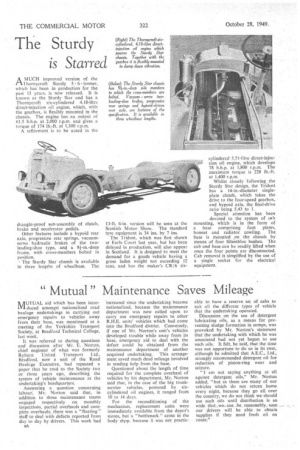" Mutual "
Page 40

If you've noticed an error in this article please click here to report it so we can fix it.
Maintenance Saves Mileage
NAUTUAL aid which has been intro
LVI amongst nationalized road haulage undertakings in carrying out emergency repairs to vehicles away from their base, was mentioned at a meeting of the Yorkshire Transport Society, at Bradford Technical College, last week.
It was referred to during questions and discussion after Mr. E. Norton, chief engineer of what was formerly Ryburn United Transport Ltd., Bradford. now a unit of the Road Haulage Executive, had repeated a paper that he read to the Society two or three years ago, describing the system of vehicle maintenance at the undertaking's headquarters.
Answering a question concerning labour: Mr. Norton said that, in addition to three maintenance teams engaged respectively on monthly inspections, partial overhauls and corn.pletc overhauls, there was a "floating" staff to deal with defects reported from day to day by drivers. This work had increased since the undertaking became nationalized, because the maintenance department was now called upon to carry out emergency repairs to other R.H.E. units' vehicles which had come into the Bradford district. Conversely, if one of Mr. Norton's unit's vehicles developed trouble while away from its base, emergency aid to deal with the defect could be obtained from the maintenance department of another acquired undertaking. This arrangement saved much dead mileage involved in sending help from the base.
Questioned about the length of time required for the complete overhaul of vehicles by his department, Mr. Norton said that, in the case of the big trunkservice vehicles, powered by sixcylindered oil engines, it ranged from 10 to 14 days.
For the reconditioning of the mechanism, replacement units were immediately available from the depot's stores, but a "bottleneck" arose in the body shpp. because it was not practic
able to have a reserve set of cabs to suit all the different types of vehicle that the undertaking operated.
Discussion on the use of detergent lubricating oils, as a means for preventing sludge formation in sumps, was provoked by Mr. Norton's statement• that the undertaking with which he was associated had not yet begun to use such oils. It felt, he said, that the time was not opportune to do so in its case, although he admitted that A.E.C., Ltd., strongly recommended detergent oil for reduction of piston-ring wear and seizure.
"I am not saying anything at all against detergent oils," Mr. Norton added, "but as there are many of our vehicles which do not return home every night, because they go all over the country, we do not think we should use such oils until distribution is so wide that can _be. reasonablysure our drivers will be able to obtain supplies if they need fresh oil en route."




























































































